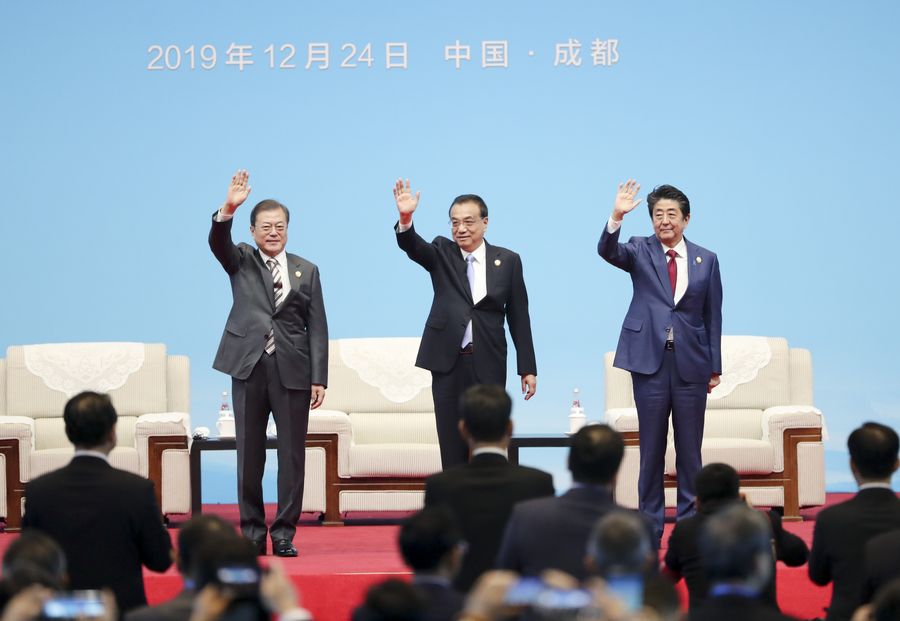 On the trilateral meeting in Chengdu, China is approaching S. Korea and Japan for more economic cooperation amid the trade uncertainty with the U.S. (Image via China.org.cn)
On the trilateral meeting in Chengdu, China is approaching S. Korea and Japan for more economic cooperation amid the trade uncertainty with the U.S. (Image via China.org.cn)
China approaches Japan and S. Korea amid U.S trade uncertainty
On Wednesday, hosting the trilateral summit in Chengdu, China approached Japan and South Korea (S. Korea) for more trade deals and offered infrastructure supports.Meeting with the Prime Minister of Japan, Shinzo Abe, China’s Premier, Li Keqiang, stated Beijing’s willingness to boost economic cooperation with Tokyo in third-country markets and further its services industry. The meeting was held on the sidelines of the trilateral summit.
Previously, also meeting the President of S. Korea, Moon Jae-in, on Monday, Li said that China wants to work on a railway project connecting S. Korea with China and Europe.
On Tuesday’s summit, the three countries also mentioned a new trilateral free-trade pact, a separate, China-backed deal that, if signed, will be the world’s biggest deal. In 2018 alone, the trilateral countries’ trade was worth more than US$720 billion.
The summit also covered the Regional Comprehensive Economic Partnership (RCEP) pact. RCEP pact will account for 30 percent of global gross domestic product (GDP) and loop in half of the global population. However, in a summit in November, India walked out of the pact.
The members of RCEP to this day are 10 ASEAN states, China, Japan, South Korea, Australia, and New Zealand. And, they aim to sign the pact next year after the draft has been completed and agreed upon.
It is known that China and the United States (U.S) are fighting each other in a ground-breaking trade war that shakes the entire global economy. Both countries imposed tariff hikes on each other.
The President of the U.S, Donald Trump, said on Friday that he had maintained a “very good talk” with his Chinese counterpart, Xi Jinping, hinting that both countries are getting closer to signing the “Phase One” agreement that will put an end to the raging trade war.
However, the details of the “Phase One” negotiation remains unknown to this day. Officials stated that the translation and legal work are not done yet.
Furthermore, the U.S legislators are getting on China’s nerve by supporting Hong Kong protesters with the Hong Kong Rights act and condemning the crackdown and mass internment of the Muslims and ethnic minorities in Xinjiang.
Source: https://bit.ly/35XdZ0n
 English
English Japan
Japan

prednisone 10 prednisone 30g side effects of prednisone for dogs how long for prednisone to leave body
provigil use 300 mg modafinil modafinil and adderall metabolism interactions what does provigil show up as on a drug test
zithromax for dogs zithromax no prescription over the counter zithromax z pak what is the medicine azithromycin used for
viagra delivered overnight women take viagra food and drug administration new viagra replacement viagra homme what is better viagra or cialis cvs pharmacy drug price list legitimate online pharmacies india online viagra pharmacy prices for viagra clever one liners generic cialis only in usa sildenafil at walmart pharmacy viagra without a doctor prescription viagra on sale in usa lowest price for prescription drugs viagra receptfritt male libido enhancement how long does viagra work for what does female viagra do for women viagra pour homme eli lilly internships how effective is cialis for bph bestellen viagra increased libido in women best price 100mg generic viagra buy generic drugs from india snorting viagra cialis for daily use dose youtube trimix injection video
generic priligy sildenafil and dapoxetine tablets online what is dapoxetine and sildenafil tablets
albuterol sulfate inhalation albuterol buy online what is albuterol sulfate for albuterol when pregnant
neurontin diabetic neuropathy neurontin 400 mg side effects how dangerous is gabapentin
ventolin hfa expired albuterol 0.63 how much are ventolin inhalers what drugs are in ventolin
adrenal fatigue prednisone can i drink alcohol with prednisone how long does prednisone affect your immune system
ivermectin sheep drench where can i buy oral ivermectin treating sarcoptic mange with ivermectin how does ivermectin kill mosquitoes
green leaf shaped pill causes of low libido little green pills for anxiety lady viagra sildenafil tablets 100 mg cialis 5 mg tablet generic viagra at costco
ivermectin medicine ivermectin 0.1 is ivermectin over the counter what worms does ivermectin kill in dogs
medicamento neurontin average cost of gabapentin how does neurontin interact with hydrocodone how long does it take for gabapentin to work for restless legs
lady viagra pink pill libido booster for women sildenafil in heart failure lady viagra dove soap samples for physicians janssen patient assistance program xarelto
prednisone water retention buy prednisone online usa how to taper off prednisone schedule dog what time of day to take prednisone
neurontin radicular pain neurontin 50mg tablets neurontin is it a narcotic how long does gabapentin last in your system
prednisone euphoria 50mg prednisone tablets how long should you take prednisone what is prednisone used for?
ventolin or proair ventolin buy canada difference between symbicort and ventolin where can i buy ventolin nebules online
injectable ivermectin stromectol generic ivermectin for scabies in humans how long does ivermectin take to kill scabies
viagra pricing comparison cost of 100 mg viagra at walmart v medical online store pharmacy buy viagra online fda approved male enhancement drugs does viagra work for girls when does cialis patent expire